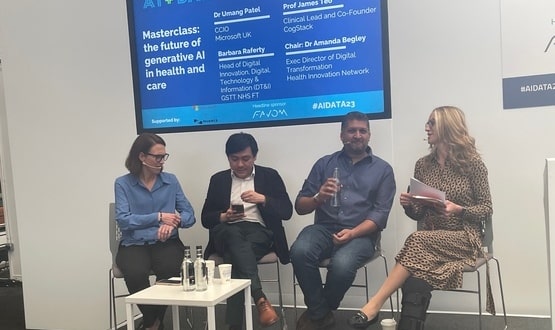Generative AI masterclass: focus on problem-solving and be confident
- 30 October 2023

Generative AI has the ability to be transformational as long as both clinicians and entrepreneurs working in the space are focused on problem-solving, panellists told a Masterclass at Digital Health AI and Data’s AI and Analytics Stage on Monday.
Umang Patel, CCIO of Microsoft UK, told the audience at London’s Business Design Centre that they need to “find the problem you really want to solve” and not be afraid, adding that the generative AI space suffers from an excess of imposter syndrome.
“If anyone goes to a CIO asking for their time, they will give it to you,” he added. “Don’t be afraid to ask for help.”
Professor James Teo, professor of neurology at King’s College Hospital, emphasised the importance of building infrastructure rather than focusing first on end-use, adding that “infrastructure is what everything will depend on.” Those looking to pursue generative AI projects also need to find likeminded people, those with both technical and clinical skills, he added.
The technology now has the capability to do a deep phenotyping of whole hospitals and populations, he said. He added that researchers can evaluate 20 years of records for a million patients, using AI to read them all and draw up patterns of diseases – completing the task within a week.
Barbara Rafferty, head of digital innovation, digital technology & information at Guy’s and St. Thomas’s NHS Foundation Trust, reflected that a “clever use case” is important for attracting the interest of trusts.
Patel, a paediatrician, compared the evolution of large language models to the history of the combustion engine albeit at an exponentially rapid speed. While the combustion engine took 50 years to the model that is recognisable today, he noted, generative AI is already reinventing healthcare due to its reasoning ability, something that hasn’t been seen previously. This capacity makes it applicable to health providers, payers and the life sciences sector.
He described the potential of generative AI as both “delightful” and “exciting.”
“The game-changing input will make it a lot more ubiquitious,” he said, adding that generative AI has the potential to unlock $1 trillion in unrealised improvement potential in healthcare. “We can’t apply the same rules we have before.”
Patel spoke to Digital Health news exclusively in the run up to the AI and Data conference, saying that regulation and support will be essential to the expansion of LLMs in healthcare, and that he is optimistic about the prospects for global cooperation on regulating AI.
Panellists identified a number of challenges, including establishing a regulatory framework, bias, hallucinations, overconfidence, patient expectations and trainee supervision. Discussion focused on hallucinations – where an AI model generates false or illogical outputs that are not based on real data or events.
“I don’t think we can get away from them – they are like great medications with side effects,” Patel said. “It’s a question of how to set guidelines to make sure we can validate against them.”
Teo suggested that hallucinations can be addressed through mitigating factors.
“Presenting outputs to someone who can tell these are hallucinations will help,” he said. “It’s a solvable problem but use cases will be aimed at outputting to people who are able at some stage level to filter that information.”




